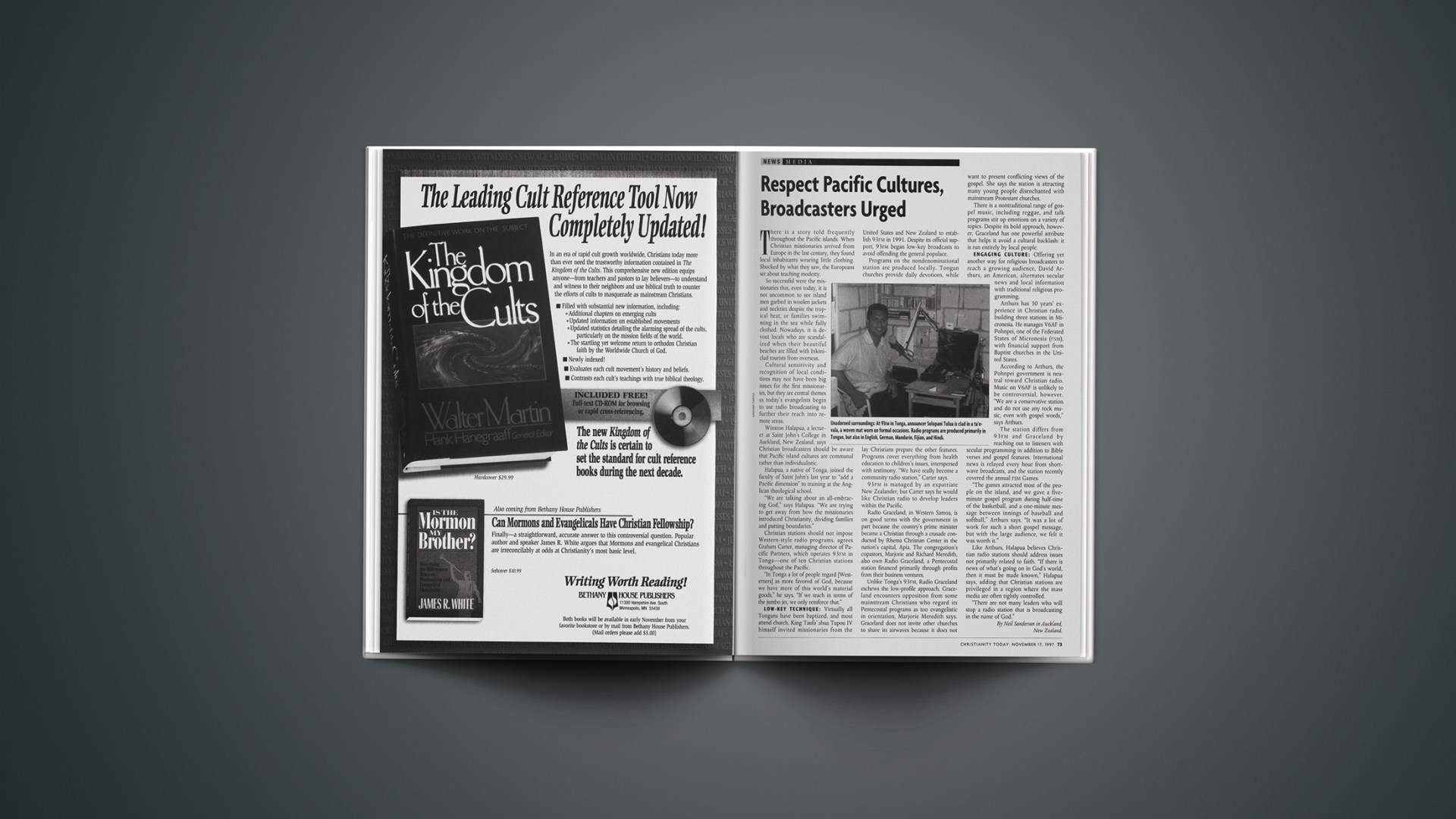There is a story told frequently throughout the Pacific islands. When Christian missionaries arrived from Europe in the last century, they found local inhabitants wearing little clothing. Shocked by what they saw, the Europeans set about teaching modesty.
So successful were the missionaries that, even today, it is not uncommon to see island men garbed in woolen jackets and neckties despite the tropical heat, or families swimming in the sea while fully clothed. Nowadays, it is devout locals who are scandalized when their beautiful beaches are filled with bikini-clad tourists from overseas.
Cultural sensitivity and recognition of local conditions may not have been big issues for the first missionaries, but they are central themes as today’s evangelists begin to use radio broadcasting to further their reach into remote areas.
Winston Halapua, a lecturer at Saint John’s College in Auckland, New Zealand, says Christian broadcasters should be aware that Pacific island cultures are communal rather than individualistic.
Halapua, a native of Tonga, joined the faculty of Saint John’s last year to “add a Pacific dimension” to training at the Anglican theological school.
“We are talking about an all-embracing God,” says Halapua. “We are trying to get away from how the missionaries introduced Christianity, dividing families and putting boundaries.”
Christian stations should not impose Western-style radio programs, agrees Graham Carter, managing director of Pacific Partners, which operates 93FM in Tonga—one of ten Christian stations throughout the Pacific.
“In Tonga a lot of people regard [Westerners] as more favored of God, because we have more of this world’s material goods,” he says. “If we teach in terms of the jumbo jet, we only reinforce that.”
LOW-KEY TECHNIQUE: Virtually all Tongans have been baptized, and most attend church. King Taufa´ahua Tupou IV himself invited missionaries from the United States and New Zealand to establish 93FM in 1991. Despite its official support, 93FM began low-key broadcasts to avoid offending the general populace.
Programs on the nondenominational station are produced locally. Tongan churches provide daily devotions, while lay Christians prepare the other features. Programs cover everything from health education to children’s issues, interspersed with testimony. “We have really become a community radio station,” Carter says.
93FM is managed by an expatriate New Zealander, but Carter says he would like Christian radio to develop leaders within the Pacific.
Radio Graceland, in Western Samoa, is on good terms with the government in part because the country’s prime minister became a Christian through a crusade conducted by Rhema Christian Center in the nation’s capital, Apia. The congregation’s copastors, Marjorie and Richard Meredith, also own Radio Graceland, a Pentecostal station financed primarily through profits from their business ventures.
Unlike Tonga’s 93FM, Radio Graceland eschews the low-profile approach. Graceland encounters opposition from some mainstream Christians who regard its Pentecostal programs as too evangelistic in orientation, Marjorie Meredith says. Graceland does not invite other churches to share its airwaves because it does not want to present conflicting views of the gospel. She says the station is attracting many young people disenchanted with mainstream Protestant churches.
There is a nontraditional range of gospel music, including reggae, and talk programs stir up emotions on a variety of topics. Despite its bold approach, however, Graceland has one powerful attribute that helps it avoid a cultural backlash: it is run entirely by local people.
ENGAGING CULTURE: Offering yet another way for religious broadcasters to reach a growing audience, David Arthurs, an American, alternates secular news and local information with traditional religious programming.
Arthurs has 30 years’ experience in Christian radio, building three stations in Micronesia. He manages V6AF in Pohnpei, one of the Federated States of Micronesia (FSM), with financial support from Baptist churches in the United States.
According to Arthurs, the Pohnpei government is neutral toward Christian radio. Music on V6AF is unlikely to be controversial, however. “We are a conservative station and do not use any rock music, even with gospel words,” says Arthurs.
The station differs from 93FM and Graceland by reaching out to listeners with secular programming in addition to Bible verses and gospel features. International news is relayed every hour from short-wave broadcasts, and the station recently covered the annual FSM Games.
“The games attracted most of the people on the island, and we gave a five-minute gospel program during half-time of the basketball, and a one-minute message between innings of baseball and softball,” Arthurs says. “It was a lot of work for such a short gospel message, but with the large audience, we felt it was worth it.”
Like Arthurs, Halapua believes Christian radio stations should address issues not primarily related to faith. “If there is news of what’s going on in God’s world, then it must be made known,” Halapua says, adding that Christian stations are privileged in a region where the mass media are often tightly controlled.
“There are not many leaders who will stop a radio station that is broadcasting in the name of God.”
Copyright © 1997 Christianity Today. Click for reprint information.










